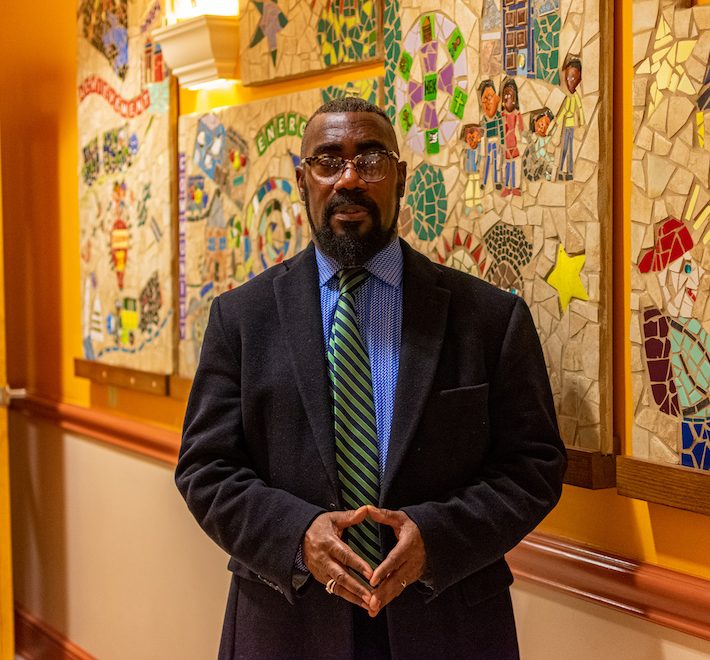Every Friday, Lilian Cavanagh, accompanied by one to three other University of Maryland, Baltimore County students, enters The Commons’ loading dock and slips into The Commons’ kitchen, an area typically reserved for employees. Instead of getting kicked out, the students are greeted by the kitchen staff who direct them to a large pile of food that is theirs for the taking. Cavanagh, a junior mechanical engineering major, is the president of the Food Recovery Network, a student organization that collects food to donate to local charities. Cavanagh joined the club her freshman year with the intention of lowering food waste to help the environment. She transitioned from director of operations to president this year after the previous executive board members graduated.
The Food Recovery Network is a chapter of a national nonprofit by the same name, which promotes college students across the country to recover perishable foods that otherwise would be thrown out by campus dining halls. According to the Food Recovery Network’s website, the organization started in 2011 at the University of Maryland, College Park. Two years later, UMBC founded its own chapter and has now donated over 7,000 pounds of food. (This figure excludes the current academic year’s donations).
The Food Recovery Network works in collaboration with Chartwells, the company that operates UMBC’s dining services. Chartwells supplies the club with food from Chick-fil-A, Dunkin’ Donuts, Einstein Bros. Bagels and Outtakes. The club collects the food on Fridays because most of the food expires over the weekends and would have to be thrown out.
 Lilian Cavanaugh and Eleanor Nancarrow take food from The Commons kitchen to donate to Baltimore area charities. Photo by Alex McKenzie.
Lilian Cavanaugh and Eleanor Nancarrow take food from The Commons kitchen to donate to Baltimore area charities. Photo by Alex McKenzie.
“Our relationship has strengthened a lot with Chartwells,” Cavanagh said. “They make it as easy as possible for us.”
Even with the work of the Food Recovery Network, food waste is still an issue on campus. For example, Dunkin’ Donuts and Einstein Bros. Bagels make their food fresh every day and end up having to throw out whatever they didn’t sell each night. Additionally, the Food Recovery Network has facilitated many impromptu collections from the Student Events Board or other student organizations that order too much food for events and are unsure what to do with leftovers.
“Try not to buy more than you need,” Cavanagh advises. “Be more conscientious of what you are throwing out and what you keep.”
Along with food waste, food insecurity is a continuous concern on campus and the surrounding community. The University has supported organizations such as Retriever Essentials, which works to lessen food insecurity on campus through donation boxes for nonperishable foods, and programs like Save-a-Swipe, where meal plan swipes are donated to students who are identified as food insecure. There are several local charitable organizations that help those in the community who are food insecure including My Brother’s Keeper, where the Food Recovery Network donates the food they collect.
Located on Frederick Road in Baltimore, My Brother’s Keeper originated in the 1980s as a place for community members to get coffee and necessities like clothing. It developed into a soup kitchen for 13 years before transforming a year and a half ago into a resource center with a meal service program. My Brother’s Keeper serves home-cooked meals to about 50 to 80 people a day, seven days a week.
“If you’re hungry, you can’t think about anything else,” said Kevin Mason, a licensed clinical professional counselor and the director of My Brother’s Keeper. Mason explained that many members of the community often have to choose between paying their electricity and water bills or getting groceries. “A meal is one stress that we can take off them that week.”
My Brother’s Keeper relies largely on donated food to provide their meals. Each week, the Food Recovery Network makes the ten-minute drive from campus to the resource center with about 50 to 75 pounds of food. The exact amount of food and what kind of food is recovered differs each time. For instance, one week they received over 30 pounds on chicken from Chick-fil-a, in addition to the other food that was donated. Lately, the Food Recovery Network has been donating large quantities of chicken, bagels, mac-n-cheese and donuts.
 Kevin Mason poses in front of artwork at My Brother’s Keeper. Photo by Alex McKenzie.
Kevin Mason poses in front of artwork at My Brother’s Keeper. Photo by Alex McKenzie.
“I always feel bad when we give them food with so much sugar,” said Eleanor Nancarrow, a junior studying management of aging services. Nancarrow is one of the newer members of the Food Recovery Network but is dedicated to the club and helps out whenever she can by loading the cars with food and transporting them to My Brother’s Keeper.
Within My Brother’s Keeper, there is a medical center where community members can meet with a nurse practitioner and a dietitian who provide diabetes screenings and assistance to those with cardiovascular health issues. Diabetes awareness and education are a focal point for My Brother’s Keeper because it is increasingly prevalent in the community.
In addition to the medical center, My Brother’s Keeper has a job hub to help people get into the workforce and to learn important computer skills required in most job fields. Other services they provide include case management, therapy, programs about substance abuse, haircuts, clothes, transportation vouchers and more. “This is a place of refuge,” Mason said. “They feel safe and validated here because we maintain dignity and integrity while working with them.”
“No one has to go into their pockets for anything here,” Mason said. “We couldn’t do it without our partners like UMBC.”





